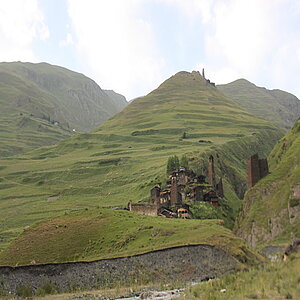Regional Climate Change Adaptation Strategy in Central Asia

The IKI project “Capacity development for climate policy” is supporting its partner countries in the implementation of their Regional Climate Change Adaptation Strategies.
Central Asia is facing the negative impacts of climate change, including rising temperatures, extreme weather events, and effects on critical sectors such as water, energy, and agriculture. While the countries in the region have developed national policies for climate change mitigation and adaptation, given the transboundary nature of climate risks and shared natural resources, collective actions to combat climate change are necessary to address the climate-related problems.
At the 2023 UN Climate Change Conference (COP28) in Dubai, the governments of Kyrgyzstan, Kazakhstan, Tajikistan, Turkmenistan, and Uzbekistan presented and adopted the Regional Climate Change Adaptation Strategy (RCCAS), developed through a high-level political dialogue process in collaboration with GIZ’s Green Central Asia (GCA) initiative. This strategy pursues the goal of developing a mechanism for cooperation between the Central Asian countries to overcome the negative impacts of climate change and to implement adaptation measures. It is foreseen to establish a joint Secretariat and a knowledge hub to support implementation of an initial Action Plan that was adopted together with the strategy.
The RCCAS lays the groundwork for national and regional multi-stakeholder collaborations to address the worsening impacts of climate change in the region, including droughts, desertification, and water scarcity on the one hand, and glacial melt, unpredictable rainfall patterns, and flooding on the other.
Involving key stakeholders to support the strategy process
In order to support the RCCAS, assess its feasibility, develop recommendations for its implementation and involve a wide range of stakeholders, the IKI project, in collaboration with the Collective Leadership Institute (CLI), recently conducted a participatory consultation and dialogue mission among key stakeholders in Central Asia.
Engaging over 200 participants in consultation sessions, 5 hybrid Country Dialogues, and one Regional Dialogue, CLI collected key content for a feasibility study. The aim was to expand the scope of involved stakeholders and to outline potential future directions for the co-implementation of the RCCAS in Central Asia.
At the five country dialogues – in Ashgabat, Tashkent, Dushanbe, Astana, and Bishkek - the participants representing different societal groups such as the civil society, academia, the public sector, development cooperation partners, regional institutions, and the private sector engaged in open and constructive discussions on key questions for collectively implementing the RCCAS, such as:
- Who needs to be involved at regional and national levels?
- What kinds of actions are needed from key stakeholder groups?
- What are the key success factors for multi-stakeholder collaboration?
- How can we assess and ensure the quality of collaboration among stakeholders?
All participants agreed that the strategy has potential to bring about real change in the region, especially if it is further embedded in larger transformation processes, such as global processes to address climate change, biodiversity loss, and desertification.
Participants confirmed that the strategy is designed to create value for all stakeholders by ensuring balanced influence and integrating the perspectives of underrepresented stakeholders. In fact, one of the key results of this dialogue is the need for a stronger involvement of civil society organizations and minorities in the implementation of the strategy. By acknowledging diversity, the strategy has the potential to create cohesive networks through transparent communication and genuine multi-stakeholder collaboration.
The stakeholder consultation meetings were concluded by participating in the 3-day Central Asia Climate Change Conference, hosted in Almaty, Kazakhstan. This conference featured rich expert inputs and exchanges, plus a formal meeting of the Regional Working Group, with officially nominated representatives from all five countries in the region. The meeting focused on discussing the establishment of an RCCAS Secretariat.
Sharing the results of the consultation mission
The consultation process was continued with an online consultation with other development organizations to share the results of the mission and discuss ways to help further align, coordinate, and jointly resource climate action in Central Asia. The development organizations highlighted the need for stronger cooperation among themselves and agreed on further supporting the strategy.
Looking to the future, CLI plans to organize an online validation process to incorporate the feedback of the stakeholders. This will focus on sharing CLI’s observations of the current stakeholder system and recommendations for the onward collaboration journey.
Overall, while the RCCAS provides an excellent basis for tackling climate change in Central Asia, a stronger regional dialogue structure between the various stakeholders is recommended in order to successfully implement a climate change adaptation strategy in the future.
The link has been copied to the clipboard
Contact
IKI Office
Zukunft – Umwelt – Gesellschaft (ZUG) gGmbH
Stresemannstraße 69-71
10963 Berlin








![[Translate to English:]](/fileadmin/_processed_/1/9/csm_20231120_eroeffnung_klimabuero_GIZ_Gate_Agency_443014c5e2.jpg)






